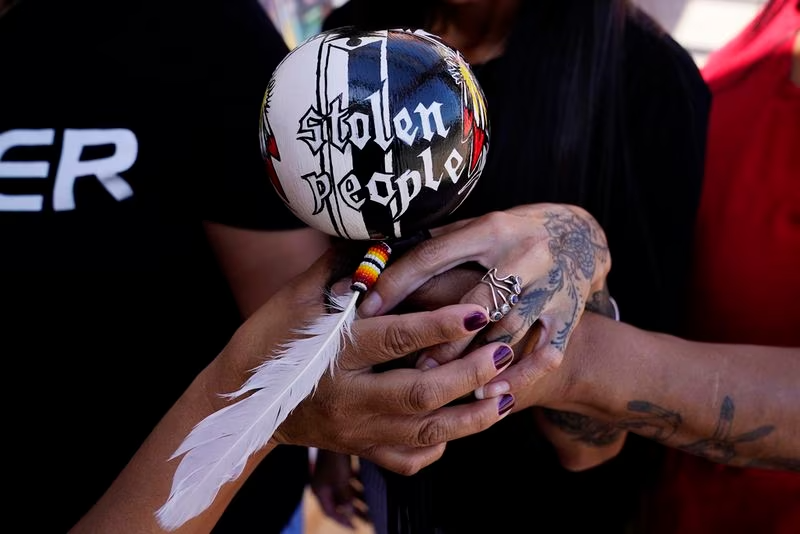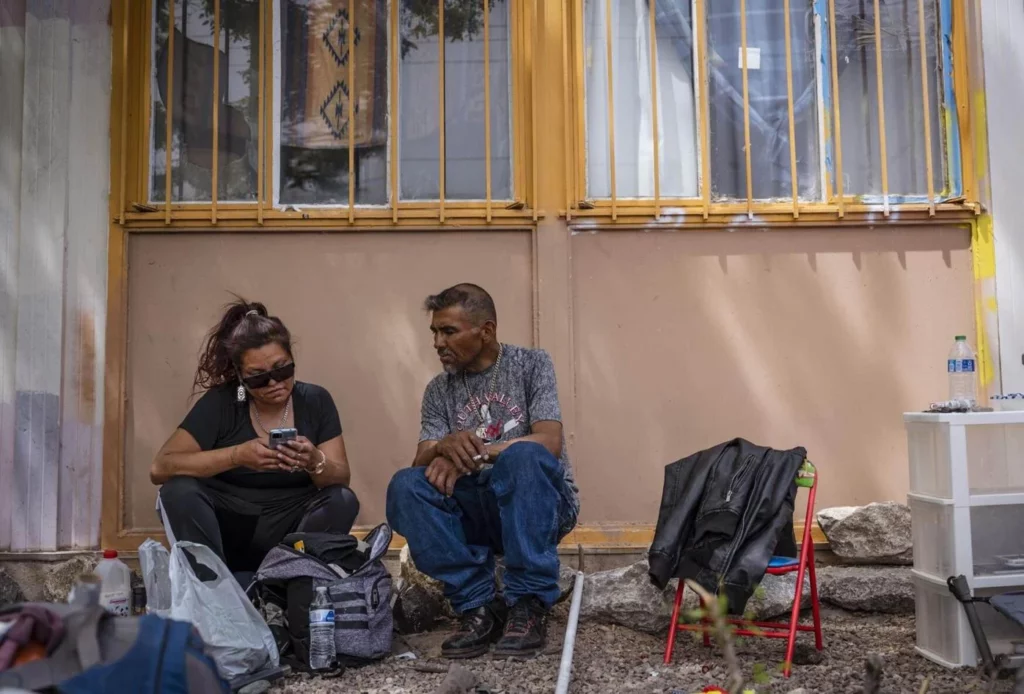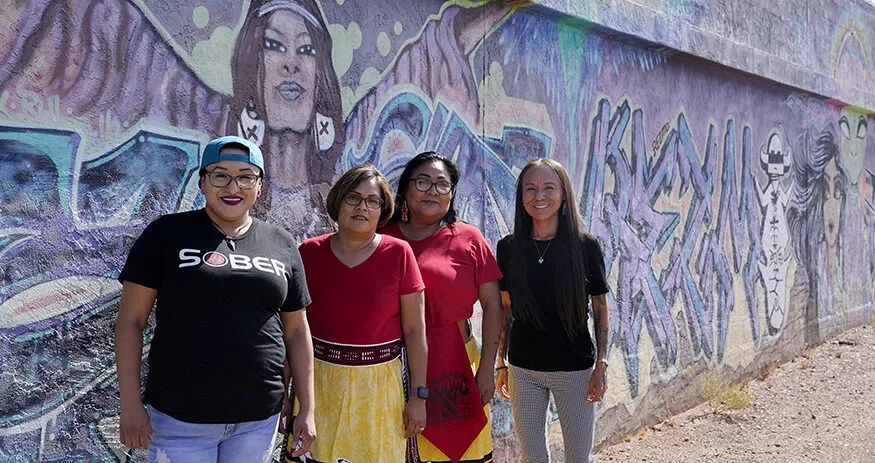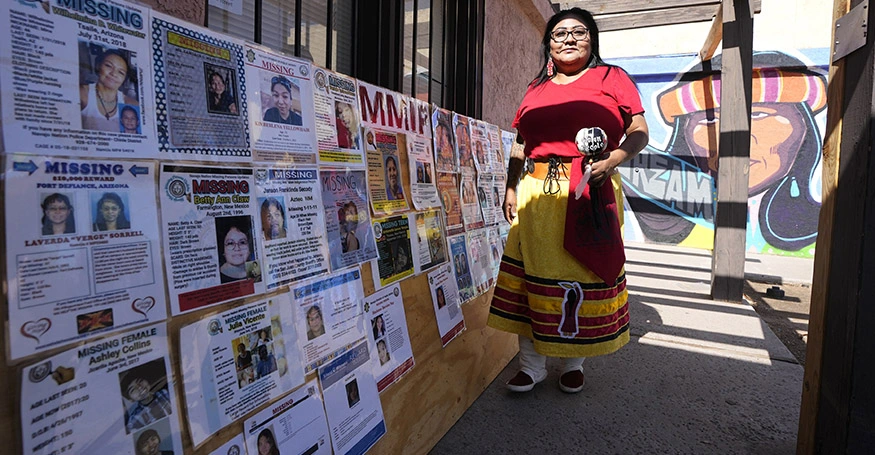Exploiting vulnerable populations through fraudulent healthcare schemes has reached a crisis point in several communities.
Particularly devastating are the scams targeting Native Americans in need of rehabilitation services.
These fraudulent activities are siphoning millions in Medicaid funds and leaving countless individuals in dire straits—homeless, disconnected from their families, and sometimes even dead.
Here, we explore the extent of this tragedy, the victims it has claimed, and the efforts underway to combat it.
The Promise of Rehabilitation
In a recent interview with PBS, Autumn Nelson, a 38-year-old member of the Blackfeet Nation in Montana, shared her journey of seeking help for her alcohol addiction.
She sought advice from her community, and they recommended a rehabilitation center in Phoenix, Arizona.
She was even provided a one-way ticket for the 1,300-mile journey by the center.
Nelson was expelled from the center just a month after joining.
She raised concerns about the lack of staff diversity, particularly the absence of Native American staff in a center that catered to Native clients.
Nelson was perplexed why only one therapist was available to serve 30 clients.
She was forced into the scorching 108-degree heat in Phoenix, Arizona, with no idea where to turn.
“All of a sudden, I was out in the 108-degree heat in Phoenix, Arizona,” said Nelson. “I was scared and didn’t know where to go.”
This left her feeling frightened and abandoned.

Scams in the Name of Healing
Returning to the Blackfeet reservation, Nelson joins the ranks of hundreds of Native Americans victimized by scammers operating in the Phoenix area.
Authorities have reported that fraudulent billing practices have caused victims to become homeless while allowing the providers to live a luxurious lifestyle.
The state officials have estimated that Arizona has lost hundreds of millions of dollars in recent years due to these schemes.
Most deceptive billings were primarily processed through the American Indian Health Program, a Medicaid initiative permitting providers to directly bill for services given to Native Americans and Alaska Natives.
State and Federal Responses
The scams’ expansive impact has gained attention beyond Arizona’s borders, with alerts from state and tribal governments.
Montana’s U.S. Senator Jon Tester, a Democrat, and Governor Greg Gianforte, a Republican, have also raised concerns.
Governor Katie Hobbs and Attorney General Kris Mayes have intensified their efforts to address the issue in Arizona.
Mayes believes a criminal syndicate based in Nevada initiated the scams.
They recently announced an increase in the investigation of fraudulent Medicaid billing that began before they took office.
Federal agencies, including the FBI and the U.S. Attorney General’s Office, collaborate with Arizona prosecutors.
Tester has also encouraged the Centers for Medicare and Medicaid to conduct an investigation.
Escalation During the Pandemic
During the COVID-19 lockdowns, scams have increased, primarily due to the relaxation of regulations.
“Many rules were relaxed, allowing scammers easier access,” commented Dr. John Molina, health service director for the federally funded Native Health, a health center that caters to Native Americans in Phoenix.
He noted that the issue of addiction within the Native American community is deeply rooted in generational trauma.
“This takes us back to the early years of colonization and how Natives were taken advantage of for economic gain,” added Molina, who is of Pascua Yaqui and San Carlos Apache descent.

The Human Toll
The consequences of these scams have been devastating to various communities.
During their recent trips to Phoenix, officers from the Navajo police force encountered numerous Native Americans living on the streets.
The closure of various facilities had left these individuals without shelter.
Harland Cleveland, the special operations manager at Rainbow Bridge, noted that many were intoxicated and lacked mobile phones, leaving them unable to contact their families.
Further highlighting the risks, the New Mexico Attorney General’s “Don’t be Taken for a Ride” campaign specifically warns against accepting rides from strangers to rehab facilities in Arizona.
Stewart, who is part of the Navajo Nation and manages a nearby Native American arts shop, became involved in a related cause a year ago.
She found it suspicious when she observed vans parked outside the Phoenix Indian Medical Center, offering people places to stay.
Around the same time, her cousin vanished after entering a similar van in New Mexico.
Following an extensive journey, her cousin was expelled from the Phoenix Center for not completing the intake forms.
Fortunately, Stewart has reported that her cousin has returned to the reservation and regained sobriety.
Adding another layer of tragedy to the situation, Raquel Moody, who belongs to both the Hopi and Apache tribes, has faced personal loss.
She mourned her cousin, who died of alcohol poisoning after being ousted from a fraudulent rehab center.
Regulatory Changes and Ongoing Investigations
The tribal leadership has determined that Blackfeet members who solicit on the reservation for fraudulent programs could face hefty fines and even expulsion.
Arizona has subsequently halted Medicaid payments to the facility where Nelson resided.
The contact number on the provider’s LinkedIn account is no longer operational.
As of August 18th, the state has suspended Medicaid payments to over 300 other providers due to “credible allegations of fraud.”
Some providers have ceased operations, while others have filed appeals to continue their services.
In response, AHCCCS has implemented more stringent regulations, including a six-month freeze on enrolling new behavioral health clinics for Medicaid billing.
High-risk behavioral health providers must undergo site visits and fingerprint-based background checks during enrollment or revalidation.
Legal Cases and Consequences
Last year, a 29-year-old man named Johnwick Nathan was accused of various crimes, such as fraud, money laundering, and forgery.
The authorities believe that Nathan illegally charged Medicaid for services provided to Native American clients, but Nathan denies this allegation.
His trial is scheduled to take place on September 18th.
Such scams can yield substantial profits.
In a federal case, a woman who ran a counterfeit recovery program in Mesa, Arizona, entered a guilty plea in July for wire fraud and money laundering.
She amassed over $22 million in Medicaid funds between 2020 and 2021 for never-rendered services.
It is unclear from the court documents if the patients were Native Americans.
The documents only state that they were taken to the facility once and then charged under their names for up to 90 days.
The billing records also contained names of deceased individuals and those in prison.
A woman named Diana Marie Moore, who is 42 years old, is scheduled to be sentenced on December 18th due to an investigation carried out by the Internal Revenue Service.
A federal court has ordered her to surrender any assets obtained through fraudulent means, including four houses, seven high-end cars, and a collection of luxury items such as Rolex watches, diamond rings, and a variety of Louis Vuitton handbags.

Grassroots Efforts
In Phoenix, grassroots initiatives like the one led by Reva Stewart and a group of Native American women have established an online network to locate missing individuals, whom they call “our relatives.”
This network shares information about the missing persons on various social media platforms.
One of the volunteers in Stewart’s group, Moody, has quit drinking and is now assisting Native American families in finding their lost relatives who were sent to rehab homes.
The group goes by the hashtag #stolenpeoplestolenbenefits.
Reflecting on her experience, Nelson said, “That earlier situation traumatized me, but now it has encouraged me to stand up.”
A Call for Vigilance and Accountability
Nelson’s story is a cautionary tale, highlighting the need for stringent regulations and community vigilance to protect vulnerable populations.
As investigations continue, the hope is that justice will prevail, not only for Nelson but for the hundreds who have been similarly exploited.
Autumn Nelson, who was once a victim, has become a symbol of strength and positivity.
Despite her circumstances, she remains optimistic about her sobriety, demonstrating that the human spirit can overcome even the darkest situations.
If you or someone you care about is battling addiction, we encourage you to contact us at Cornerstone Healing Center in Scottsdale, AZ.
We are a certified addiction treatment center that has received exceptional reviews and ratings.
Our approach to lasting recovery involves holistic healing practices that address addiction’s root causes.
Let us help you today!
SOURCES/ARTICLES
-
Fake Arizona rehab centers scam Native Americans from across the country, officials warn during investigations
-
Fake Arizona rehab centers scam Native Americans far from home, officials warn during investigations
-
Fake Arizona rehab centers scam Native Americans, rake in millions







